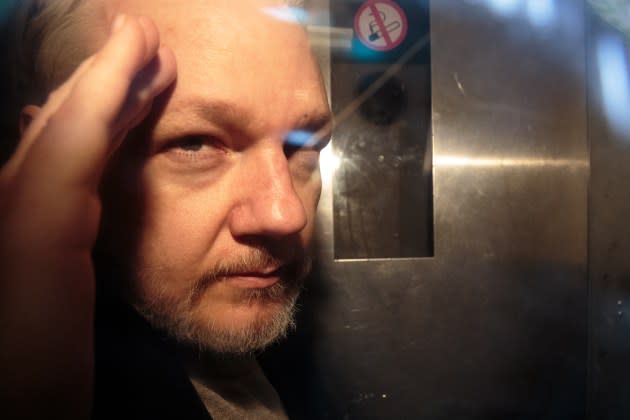U.S. Authorities Drop Julian Assange Extradition Demand & Strike Plea Deal; Outcome Hailed As “Historic Victory” For Press Freedom

UPDATED with WikiLeaks footage showing Julian Assange leaving UK: Julian Assange has struck a plea deal with the U.S. authorities that will see him avoid extradition to the U.S. on espionage charges.
Court documents show that the Wikileaks founder will instead attend a hearing in Saipan in the U.S. commonwealth territory of the Northern Mariana Islands in the Pacific at 9 a.m. local time on June 26.
More from Deadline
WikiLeaks shared footage of Assange boarding a 5 p.m. flight out of the UK’s Stansted Airport on Monday, after news of the plea deal broke around midnight UK time.
Julian Assange boards flight at London Stansted Airport at 5PM (BST) Monday June 24th. This is for everyone who worked for his freedom: thank you.#FreedJulianAssange pic.twitter.com/Pqp5pBAhSQ
— WikiLeaks (@wikileaks) June 25, 2024
A letter released by the U.S. Department of Justice states that Assange will be tried on the single charge of conspiring to unlawfully obtain and disseminate classified information relating to the national defense of the U.S. under the Section 793 Espionage Act and be sentenced for that offense.
In return for pleading guilty to the charge, Assange will be sentenced to time served, 62 months — the same amount of time he has spent in the UK’s high-security Belmarsh prison.
After the hearing, he will be sent to his native Australia.
The deal ends a 14-year extradition battle with authorities in the U.S. where Assange is wanted on charges related to WikiLeaks’s 2010 internet dump of more than 500,000 secret government, military and diplomatic documents and other reports connected to the wars in Iraq and Afghanistan.
The operation follows a UK High Court ruling in May allowing Assange to challenge U.S. assurances over how a trial would be conducted in the U.S. and whether his right to free speech would be infringed.
U.S. prosecutors had accused Assange of conspiring with U.S. army intelligence analyst Chelsea Manning to hack into a Pentagon computer and then release classified diplomatic cables and military files.
He has always denied the allegations. His supporters have said the leaks were in the public interest.
Assange faced 17 counts of espionage and one count of computer misuse under the U.S. Espionage Act. His lawyers feared he faced up to 175 years in prison if convicted, while U.S. authorities said the sentence would be much shorter.
Journalism organizations worldwide said that the prosecution of Assange under the U.S. Espionage Act would be a serious blow to press freedom.
In one of the most high-profile state whistleblowing cases of recent times, Assange has been trying to avoid extradition to the U.S. since 2011.
His battle began in August 2010 after Swedish prosecutors issued an arrest warrant against him following rape and sexual assault accusations, which were later dropped.
He left Sweden for the UK shortly after the allegations. A London court ruled in 2011 he could be extradited back to Sweden.
Assange continued to deny the allegations but said he did not want to travel to Sweden to testify for fear it would result in him being extradited to the U.S. more easily.
He skipped bail and sought refuge in the Ecuadorian embassy in London in June 2012 to avoid being extradited to Sweden.
He remained in the embassy until April 2019 when Ecuador withdrew his asylum status after he fell out of favor with Ecuadorian President Lenin Moreno, who replaced original protector President Rafael Vicente Correa in 2017.
UK police immediately arrested Assange for breaching bail conditions related to the 2012 Swedish charges, as well as on behalf of the U.S. authorities.
He has spent the last five years in Belmarsh prison in southeast London, battling extradition.
Reporters Without Borders RSF hailed the outcome as a historic victory for press freedom and the right to information.
“RSF has been fighting to secure Julian Assange’s release for the duration of his incarceration. In fact, our team, and in particular Director of Campaigns Rebecca Vincent, were the only NGO representatives present in the London court room for every single one of Assange’s hearings and the only NGO to visit him in prison,” said RSF USA Executive Director Clayton Weimers.
“His release represents a vindication of that years’ long fight. This is a victory for press freedom, but until the Espionage Act is reformed to include a public interest defense, this ordeal could happen to any publisher of leaked classified material, including journalists and media outlets.”
Also responding to the news of the plea deal, Electronic Frontier Foundation Civil Liberties Director David Greene welcomed the fact that Assange had been freed but warned it set a “dangerous precedent”.
“The United States has now, for the first time in the more than 100-year history of the Espionage Act, obtained an Espionage Act conviction for basic journalistic acts: obtaining information from a source and expressing an openness to receiving more highly newsworthy information,” he said.
“This sets a dangerous precedent, and all those who value a free press should work to make sure that it never happens again. While we are pleased that Assange can now be freed for time served and return to Australia, these charges should never have been brought.”
Best of Deadline
Hollywood & Media Deaths In 2024: Photo Gallery & Obituaries
2024 Premiere Dates For New & Returning Series On Broadcast, Cable & Streaming
Sign up for Deadline's Newsletter. For the latest news, follow us on Facebook, Twitter, and Instagram.

